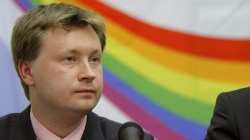BY NATASHA BARSOTTI — A Russian regional court has found that gay pride marches and rallies against a law prohibiting so-called propaganda of homosexuality were illegally banned, a Gay Star News (GSN) report says.
![]()
According to the report, the press secretary of the Kostroma regional court announced that gay rights activist Nikolai Alexeyev’s appeal of a district court’s decision on the matter was granted and that activists can “already apply for these activities.”
“Gradually international and local pressure is bearing fruit,” GSN quotes Alexeyev as saying. “I cited court cases we have won in the UN Human Rights Committee and the European Court of Human Rights. This is a good sign and a good example for other courts that you cannot ban public events such as gay pride.”

But the press secretary also noted that the regional court upheld the lower court’s decision that pickets at the Kostroma Regional Children’s Library and the Regional Youth Library constituted “propaganda of homosexuality” that can be harmful for minors. Alexeyev says he intends to appeal that ruling, as well as continue the fight against all the bans throughout Russia in local and international courts, GSN says.
Kostroma, Ryazan, St Petersburg, Novosibirsk, Arkhangelsk and at least four other
regions have all passed anti-gay gag laws. Bucking the national trend,
the Duma of the Moscow Region rejected a similar measure meant to make
“non-traditional sexual orientation propaganda to minors” illegal.
The United Nations Human Rights Committee (UNHRC) found Ryazan’s anti-gay law, prohibiting “public actions aimed at
propaganda of homosexuality among minors,” to be discriminatory and a
violation of freedom of expression in the case of a queer rights
activist convicted under the measure. ![]() In March 2009, Irina Fedotova displayed posters that declared “Homosexuality
In March 2009, Irina Fedotova displayed posters that declared “Homosexuality
is
normal” and “I am proud of my homosexuality” near a secondary school in
Ryazan. She was arrested, convicted and ordered to pay a
fine of 1,500 rubles.The UN committee found Russia had violated the International Covenant on Civil and
Political Rights, of which it is a signatory, in the areas of freedom of
expression and discrimination.
An impatient judge also acquitted pop star Madonna
of “brutally violating” St Petersburg’s anti-gay gag law following a
concert tour in which she spoke out against the measure, handed out pink
wristbands and urged the crowd to show support for queers.

 Why you can trust Xtra
Why you can trust Xtra


